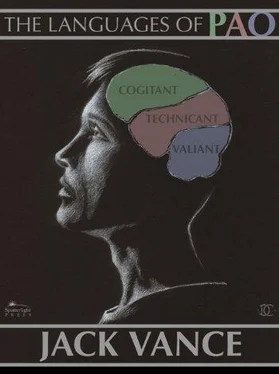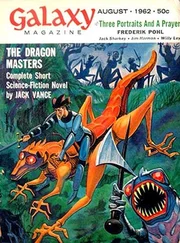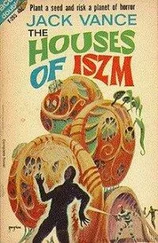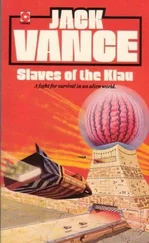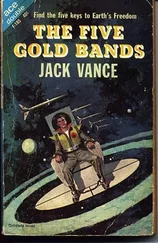Bustamonte slowly picked himself up to stand shaking in rage.
Eban Buzbek waved his hand. Bustamonte was seized, trussed with belts, rolled into a net. Without further ado, the Brumbos climbed into the saddles and rode through the sky, with Bustamonte hanging below like a pig for the market.
At Spyrianthe the group transferred into a domed air-ship. Bustamonte, dazed from the buffeting wind, half-dead of chill, slipped to the deck, and knew nothing of the trip back to Eiljanre.
The air-ship landed in the court of the Grand Palace; Bustamonte was hustled through the ravaged halls and locked in a sleeping-chamber.
Early the next day two women servants roused him. They cleaned him of mud and grime, dressed him in clean clothes, brought him food and drink.
An hour later the door opened; a clansman signaled. Bustamonte came forth, pallid, nervous but still uncowed.
He was taken to a morning room overlooking the famous palace florarium. Here Eban Buzbek waited with a group of his clansmen and a Mercantil interpreter. He seemed in the best of spirits, and nodded jovially when Bustamonte appeared. He spoke a few words in the staccato language of Batmarsh; the Mercantil translated.
“Eban Buzbek hopes you have passed a restful night.”
“What does he want of me?” growled Bustamonte.
The message was translated. Eban Buzbek replied at considerable length. The Mercantil listened attentively, then turned to Bustamonte.
“Eban Buzbek returns to Batmarsh. He says the Paonese are sullen and stubborn. They refuse to cooperate as a defeated people should.”
The news came as no surprise to Bustamonte.
“Eban Buzbek is disappointed in Pao. He says the people are turtles, in that they will neither fight nor obey. He takes no satisfaction in his conquest.”
Bustamonte glowered at the pig-tailed clansman slouching in the Black Chair.
“Eban Buzbek departs and leaves you as Panarch of Pao. For this favor you must pay one million marks each Paonese month for the duration of your reign. Do you agree to the arrangement?”
Bustamonte looked from face to face. No one looked at him directly; the expressions were empty. But each warrior seemed peculiarly taut, like runners crouched at the start of a race.
“Do you agree to the arrangement?” the Mercantil repeated.
“Yes,” muttered Bustamonte. There was an imperceptible rustle of motion around the room; a regretful relaxation.
The Mercantil translated. Eban Buzbek made a sign of assent, rose to his feet. A piper bent to his diplonet , blew a brisk march. Eban Buzbek and his warriors departed the hall without so much as a glance for Bustamonte.
An hour later, Buzbek’s red and black corvette knifed up and away; before the day’s end no single clansman remained on Pao.
With a tremendous effort Bustamonte asserted his dignity, and assumed the title and authority of Panarch. His fifteen billion subjects, diverted by the Batch invasion, showed no further recalcitrance; and in this respect Bustamonte profited from the incursion.
Beran’s first weeks on Breakness were dismal and unhappy. There was no variety, inside or out; all was rock-color, in varying tones and intensities, and the look of distance. The wind roared incessantly, but air was thin, and the effort of breathing left an acrid burn in Beran’s throat. Like a small pale house-sprite, he wandered the chilly corridors of Palafox’s mansion, hoping for diversion, finding little.
The typical residence of a Breakness dominie, Palafox’s house hung down the slope on the spine of an escalator. At the top were workrooms not permitted to Beran, but where he glimpsed marvellously intricate mechanisms. Below were rooms of general function panelled in dark board, with floors of russet rock-melt, generally unoccupied except for Beran. At the bottom, separated from the main chain of rooms was a large circular structure, which Beran eventually discovered to be Palafox’s private dormitory.
The house was austere and chilly, without devices of amusement or ornament. No one heeded Beran; it was as if his very existence were forgotten. He ate from a buffet in the central hall, he slept where and when it suited him. He learned to recognize half a dozen men who seemed to make Palafox’s house their headquarters. Once or twice in the lower part of the house he glimpsed a woman. No one spoke to him except Palafox, but Beran saw him only rarely.
On Pao there was small distinction between the sexes; both wore similar garments and enjoyed identical privileges. Here the differences were emphasized. Men wore dark suits of close-fitting fabric and black skull-caps with pointed bills. Those women whom Beran had glimpsed wore flouncing skirts of gay colors—the only color to be seen on Breakness—tight vests which left the midriff uncovered, slippers tinkling with bells. Their heads were uncovered, their hair was artfully dressed; all were young and handsome.
When he could tolerate the house no longer, Beran bundled himself into warm garments and ventured out on the mountainside. He bent his head into the wind and pushed to the east until he reached the verge of the settlement, where the Wind River dwindled in mighty perspective. A mile below were a half dozen large structures: automatic fabrication plants. Above reared the rock slope, far up to the gray sky, where the wild little white sun swerved like a tin disc on the wind. Beran retraced his steps.
A week later he ventured forth again, and this time turned west with the wind at his back. A lane melted from the rock wound and twisted among dozens of long houses like that of Palafox, and other lanes veered off at angles, until Beran became concerned lest he lose his way.
He halted within sight of Breakness Institute, a group of bleak buildings stepped down the slope. They were several stories high, taller than other buildings of the settlement, and received the full force of the wind. Streaks of sooty gray and black-green ran across the gray rock-melt, where years of driven rime and sleet had left their marks.
As he stood, a group of boys several years older than himself came up the road from the Institute; they swerved up the hill, marching in a solemn line, apparently bound for the space-port.
Curious! thought Beran. How unsmiling and silent they seemed. Paonese lads would have been skipping and skylarking.
He found his way back to Palafox’s manse, puzzling over the lack of social intercourse on Breakness.
* * *
The novelty of life on the new planet had worn smooth; the pangs of homesickness stabbed Beran hard. He sat on the settee in the hall tying aimless knots in a bit of string. There was the sound of footsteps; Beran looked up. Palafox entered the hall, began to pass through, then noticed Beran and came to a halt. “Well, the young Panarch of Pao—why do you sit so quietly?”
“I have nothing to do.”
Palafox nodded. The Paonese were not ones to undertake gratuitously any arduous intellectual program; and Palafox had intended that Beran should become utterly bored, to provide incentive for the task.
“Nothing to do?” inquired Palafox, as if surprised. “Well, we must remedy that.” He appeared to cogitate. “If you are to attend the Institute, you must learn the language of Breakness.”
Beran was suddenly aggrieved. “When do I go back to Pao?” he asked querulously.
Palafox shook his head solemnly. “I doubt if you’d wish to return at this moment.”
“But I do!”
Palafox seated himself beside Beran. “Have you heard of the Brumbos of Batmarsh?”
“Batmarsh is a small planet three stars from Pao inhabited by quarrelsome people.”
“Correct. The Batch are divided into twenty-three clans, which continually compete in valor. The Brumbos, who are one of these clans, have invaded Pao.”
Читать дальше
